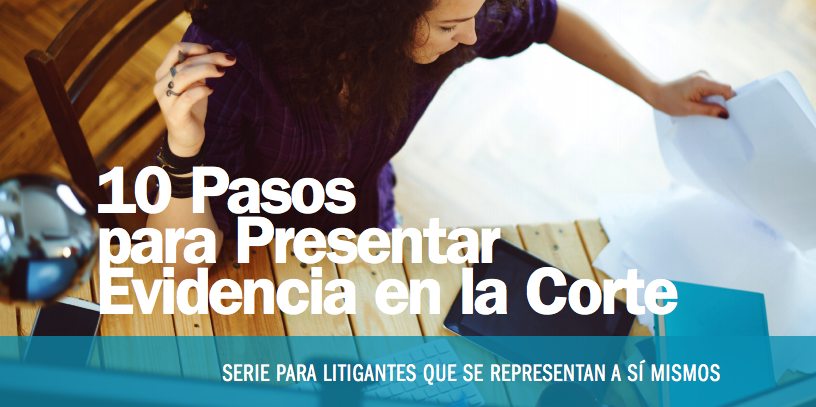By Amanda Kay, Senior Program Attorney with the Resource Center on Domestic Violence: Child Protection and Custody, a project of the National Council of Juvenile and Family Court Judges
Many survivors of domestic violence delay a decision to separate or divorce their abusive partners, knowing that seeking custody and visitation will involve conflict and heighten risks for their children and themselves (including loss of custody). On the other hand, many others hope and believe that the court will provide safety and justice that they have not been able to secure alone.
“I'm advocating for [my daughter] with everything I am. I hope to get to speak on her behalf and that her human rights are acknowledged and safeguarded by the court. I am hopeful.” – DV survivor*
A majority of family court child custody cases have at least one person who doesn’t have a lawyer, known to the courts as a self-represented litigant (SRL) or a pro se party, with rates ranging from approximately 70% to as high as 90% (Knowlton, Cornett, Gerety & Drobinske, 2016; Garcia, 2014; Macfarlane, 2013; Arkansas Access to Justice Commission, 2011). Findings from interviews with SRLs suggest that they:
- Feel disadvantaged in court compared to their represented counterparts;
- Perceive that self-representation negatively impacts their case outcomes; and
- Believe that self-representation adds stress to an already taxing experience (Knowlton, Cornett, Gerety & Drobinske, 2016).
Few SRLs voluntarily choose to represent themselves but, unable to afford costly private lawyers (also referred interchangeably as “attorneys” in this TAQ) and with very limited legal aid resources available, they find themselves facing the justice system and the courts on their own. Research shows that representation by a lawyer, especially one trained in domestic violence dynamics, results in better outcomes for survivors (Kernic, 2015). But, the harsh reality is that there are simply not enough pro bono or legal aid lawyers to meet the great need (Hadfield, 2014). On September 13, 2018, 54% of local domestic violence programs across the country were able to have advocates accompany survivors to court, but only 15% of programs were able to assist survivors with legal representation because of limited resources (NNEDV, 2019). Support from an advocate, faith leader, friend, or family member can still be invaluable in dealing with the emotional strain of a custody case.
Thus, the majority of survivors seeking courts orders or court decisions through the family court do so without an attorney’s guidance, within a system that is not designed to be trauma-informed, educational, or forgiving of people who don’t understand the law or legal protocols—and with the gravest of consequences, particularly for those in traditionally marginalized groups such as survivors of color, LGBTQ+ survivors, survivors with disabilities, and survivors with limited English proficiency.
These unfortunate circumstances are very real in the lives of the survivors and their advocates that contact the Resource Center on Domestic Violence: Child Protection and Custody (RCDV:CPC) every day, seeking help with their custody cases. The majority of calls to our 800-line are from survivors who have been unable to find an attorney (or who lost their attorney when they ran out of money) and who must now go forward with their cases alone.
Guidance for survivors representing themselves in custody cases
“I am looking for more resources to overcome the power his attorney has established in family court.” – DV survivor*
To help meet these needs, the RCDV:CPC developed a series of SRL guides on specific topics. Each guide is short and focused on one aspect of a custody case. Two of our most popular guides focus on evidence and how to provide information about the survivor’s family to the court clearly and properly, so the court can consider all of the relevant facts when making its decision. For example, along with practical information about the family (number and age of children, any needs they have, their school schedule, living arrangements, etc.), it’s extremely important for the judge to understand the tactics used by a parent who batters, especially when it might not be obvious to an outsider that it’s part of a pattern of violence. Gestures, phrases, even just a look or tone of voice can be a clear threat to family members but not seem at all concerning to others. The judge also needs to know about what survivors and their children need to be and feel safe.
Even judges who understand domestic violence must have evidence to support their decisions, which is often not provided by self-represented survivors because they don’t understand the justice system’s rules and procedures. The guides on evidence can help a survivor organize information and present it in a way the court can use. Keep in mind that some information may not apply to your court case or state.
- 10 Ways to Find Help with Your Case lists possible sources of assistance, from a local self-help center or law library to national resource centers and reliable online materials (also available in Spanish).
- 10 Things to Know About Family Court provides an overview of family court: the people that might be involved in the case (judge, mediator, court clerk, etc.), what the court can and cannot do, and other information to help orient a self-represented survivor to the family court system (also available in Spanish).
 10 Steps to Presenting Evidence provides a step-by-step guide to gathering, organizing, and presenting the information that the judge needs, including witnesses and other sources like photos, reports, and letters (also available in Spanish).
10 Steps to Presenting Evidence provides a step-by-step guide to gathering, organizing, and presenting the information that the judge needs, including witnesses and other sources like photos, reports, and letters (also available in Spanish).- How to Gather Technology Abuse Evidence for Court discusses how to document communications like texts, emails, and social media posts in a way that will be admissible in court, instead of trying to hand the judge a smartphone during the hearing.
- How to Navigate Custody Mediation in Cases Involving Domestic Violence focuses on mediation of child custody, providing an overview of what mediation is, the mediator’s role, and how to participate effectively. Suggestions for how to ask about exemptions or safety accommodations are a key aspect of the guidance provided. While mediation is the primary focus, the principles could apply in other types of alternative processes, like early neutral evaluation or settlement conferences.
While a few pamphlets can’t transform self-represented survivors into lawyers, they can provide general information and guidance, along with help in locating more specific local assistance such as self-help centers, law libraries, legal clinics, and other resources.
Plans to develop the series are ongoing. We’re working on additional translations of existing guides as well as further installments in the series. The next guide from the RCDV:CPC will focus on practical tips for creating parenting plans that are safe for survivors and their children and that meet the family’s specific needs. Other guides are in development, and we welcome ideas. If you’d like to propose a topic, please feel free to email us at fvdinfo@ncjfcj.org.
For more information:
Navigating the Civil Legal System: Resources for Survivors of Domestic Violence, Their Advocates, and Legal Professionals: This Special Collection includes legal resources for advocates and legal professionals working with survivors of domestic violence, as well as survivors who either may be representing themselves in protection order and family law proceedings or who are seeking legal referrals.
Womenslaw.org: This site offers easy-to-understand legal information and resources, including information about child custody such as common factors that a judge considers when deciding custody, the pros and cons of filing for custody, whether to ask for supervised visitation, and how to change a final custody order once you've moved to a new state. Basic legal information, referrals, and emotional support is offered via the Email Hotline.
Legal Resource Center on Violence Against Women (LRC): LRC works to obtain legal representation for survivors in interstate custody cases and to provide technical assistance to advocates and attorneys in such cases.
* Domestic violence survivor contacting the National Resource Center on Domestic Violence (NRCDV) for information and referrals.














